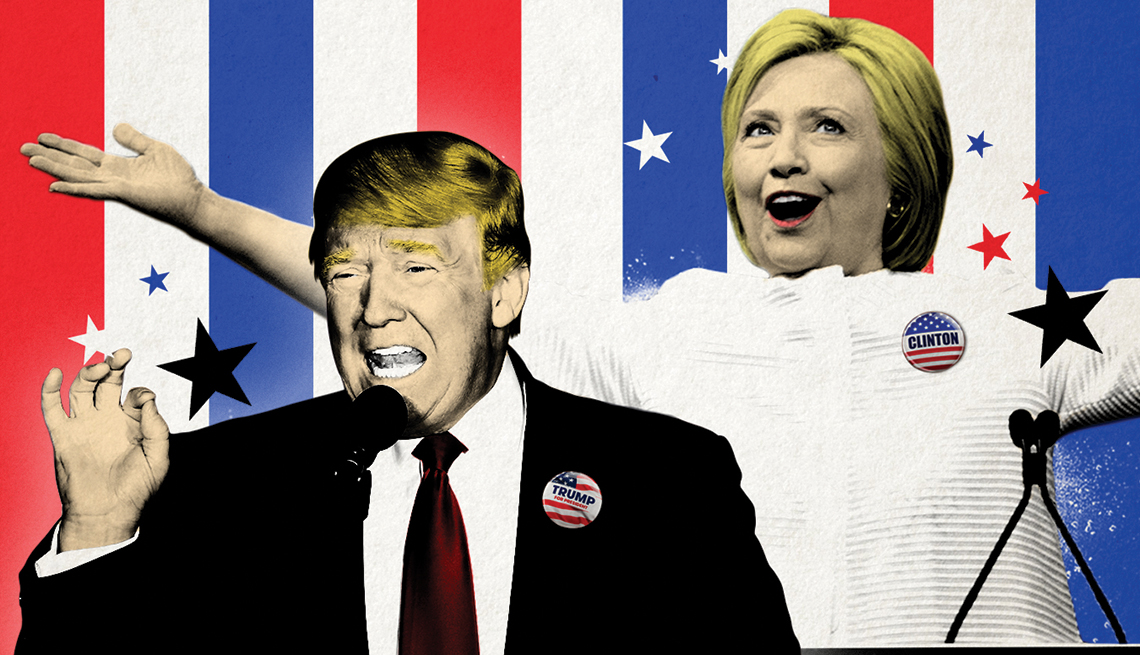The Campaign Issue You Won't Hear About
Why the candidates' ages are not a factor in the 2016 presidential election

Paul Spella
Presidential candidates Donald Trump and Hillary Clinton are just 16 months apart in age.
Back in 1984, when President Ronald Reagan ran for reelection, his age was a campaign issue. Reagan already held the title of oldest president ever inaugurated, and, at 73, he was vying to break his own record. The president had been shot by a would-be assassin in 1981 but seemed to return to robust health, as photographs of him riding horses or clearing brush at his California ranch would attest.
Even so, after he flubbed his first debate with 56-year-old Democratic nominee Walter Mondale, some gleeful Democrats seized the opportunity to portray Reagan as ready for the old folks home, not a second stint in the White House. At the second debate, though, Reagan turned the tables. When asked whether he would be physically able to endure another four years in office, the president said yes, then shut down the question with Hollywood aplomb. "I will not make age an issue of this campaign," he quipped. "I am not going to exploit, for political purposes, my opponent's youth and inexperience."
Not only did Reagan get laughs, but his well-rehearsed quip made those raising the age issue look foolish. Reagan easily won the election, and since then, the notion of a presidential candidate being too old for the White House has been fading from relevance. Republican nominee Bob Dole did face questions about his age in 1996, when at 72 he ran against President Bill Clinton. So did Sen. John McCain in 2008, when he faced the youthful Barack Obama at 71. But in neither of those contests did pollsters find age to be a deciding factor in the election.
This year, the age question has barely come up. One reason is that boomers — who in their youth didn't trust anyone over 30 — are now over 50 themselves. The younger presidential hopefuls in the primary field were understandably timid about raising the specter of elder incompetence to this huge and engaged group of older voters. And when 44-year-old Marco Rubio had the temerity to tell a crowd that Trump "would be the oldest person ever president, which is a problem," Trump ignored the suggestion — and trounced his rival.
As it turned out, the three oldest candidates in the primary races were the last ones standing. Sen. Bernie Sanders is the eldest, at 75. Next is Donald Trump (70), followed by Hillary Clinton (68). What Clinton, Sanders and Trump all share are seemingly solid health (despite some conspiracy theories to the contrary), hard-edged life experience and undaunted willpower.
To the voters, apparently, that is enough. In fact, it's more than enough: Last year, 71 percent of registered voters polled said they considered it a benefit for a presidential candidate to be older than 65. (That confidence in older, wiser Americans extends to other offices — and the entertainment world.)
The lengthening life span of Americans is a key reason that being in your 60s or 70s isn't a hurdle on the road to the White House anymore. Thanks to advances in health care, our life expectancy keeps rising; it's currently 78.8 years. And affluent Americans — like Clinton and Trump — tend to live longer than average.
But, of course, the most obvious reason age isn't an issue in the 2016 general election is that the two major-party candidates are nearly the same age; they're just 16 months apart. The age question is off the table. Both Trump and Clinton clearly dye their hair — no judgment here — and take other steps to appear youthful and vigorous. But what else would we expect? They're both boomers.
Even though they're contemporaries, the two candidates often seem to come from two separate eras. As columnist John Podhoretz recently pointed out in the New York Post, Trump's jacket-and-tie formality and flair for insult comedy recall the early-'60s glory days of Frank Sinatra and the rest of the Rat Pack. Clinton, meanwhile, reflects the other end of the decade: the late-1960s student activism that rejected the conformity of corporate life and sought a more authentic existence.
Still, from Trump's Mad Men to Clinton's Ms. magazine, both candidates seem to be benefiting from a collective agreement that the election should be decided on issues of substance and fitness for office — and that "fitness" has nothing to do with year of birth.
The bottom line is that with Americans living longer, 70 no longer seems so old. If Willie Nelson can fill an arena at 83 and Warren Buffett can shepherd a multinational conglomerate at 86, then why can't a U.S. president be elected at 69 or 70? After all, when our next president finishes four years in office, he or she will be about the same age Mick Jagger is right now.
Video: Zero Questions on Social Security: Take A Stand - 60 million Americans count on Social Security. 170 million Americans pay into Social Security. Yet ZERO questions were asked during the first presidential debate.
